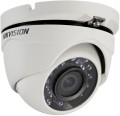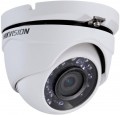Matrix size
The size of the matrix installed in the surveillance camera (diagonally).
In general, larger sensors (with the same resolution and sensor type) are considered more advanced: they get more light, which has a positive effect on image quality (especially in low light). On the other hand, increasing the size affects the cost of the entire device; and in some cases (for example, if the camera is not planned to be used in twilight and darkness), a relatively small sensor may be quite suitable.
As for specific dimensions, the most modest cameras in terms of this indicator have matrices of
1/4 "or less. Models with sensors of
1/3.8" - 1/3" and
1/2.9" - 1/2" are very popular, these values can be called average. And in advanced devices, diagonals and
more than 1/2 "(up to 1/1.7") are found.
Number of megapixels
Camera sensor resolution in megapixels (millions of pixels).
The higher the resolution of the matrix, the higher the video resolution can be (see below), the more detailed the image is capable of providing the camera. At the same time, note that as the number of megapixels increases (without changing the size of the matrix), the size of each individual pixel decreases, which increases the likelihood of noise and deterioration in the overall image quality. Therefore, high resolution in itself is not necessarily a sign of high quality — a lot depends on other things, for example, on the size of the matrix (see above).
As for specific values, in the most modest matrices it does not exceed 1.3 MP, which corresponds to the maximum
HD resolution.
2 MP sensors allow for already Full HD resolution (usually 1920x1080 or 1600x1200),
3 MP,
4 MP,
5 MP and
6 MP are capable of better resolution, but still do not reach
4K, which is typical for 8 MP.
Video resolution
The maximum video resolution that the camera can capture.
The higher the resolution of the video, the more details you can see on it, the less details will be blurry. On the other hand, high resolution means large volumes of video materials, which, accordingly, requires capacious media for their storage and fast communication channels for broadcasting video in real time. Yes, and this indicator significantly affects the cost of the camera.
Minimum illumination
The lowest degree of illumination of the scene being shot, in which the camera is able to provide normal visibility. Usually, this item specifies the values for the daytime mode of operation (in the night mode, the minimum illumination in many models may be zero at all, because in such cases the IR illumination is turned on, see "Design and capabilities"). And if the camera is capable of shooting in colour, it usually means the lowest illumination necessary to obtain a colour image.
The lower this indicator, the better the camera works in low light, the brighter and more clearly visible image it is able to provide in such conditions. At the same time, note that in low light, night mode is often preferable, and in the presence of the aforementioned IR illumination, it is more likely to focus on the range of its operation (see above).
There are comparative tables that allow you to evaluate the degree of illumination indicated in the characteristics from a practical point of view: for example, an indicator of 0.2 lux corresponds to clear eyes on a full moon.
Horizontal viewing angle
Horizontal viewing angle of the surveillance camera. For models with a variable value, the maximum value is indicated, since it is the width of the image that is important, and when zooming in, the zoom factor is more important than the angle. This paragraph also indicates the general angle of view for models with a circular field of view – in particular, cameras with a fisheye lens (see above)
The wider the viewing angle, the more space the camera captures and at the same time, the smaller the images of individual objects in the frame are obtained. Therefore, when choosing by this parameter, it is worth deciding what is more important – the ability to view a large scene or the visibility of small details in a relatively narrow field of view. Also note that with a wide field of view (100° or more), characteristic distortions can be observed at the edges of the frame, and the wider the angle, the more pronounced they are. This phenomenon can be eliminated by panoramic shooting (see "Design and features"), but this feature, in turn, complicates and increases the cost of the camera.
Power consumption
The power consumed by CCTV cameras during operation. Knowing the indicator of energy consumption, you can, for example, calculate the battery life of equipment from an uninterruptible power supply or choose a suitable “uninterruptible power supply”. Also, with the support of PoE technology, it is worth considering the power consumption when choosing a PoE switch or PoE adapter.

